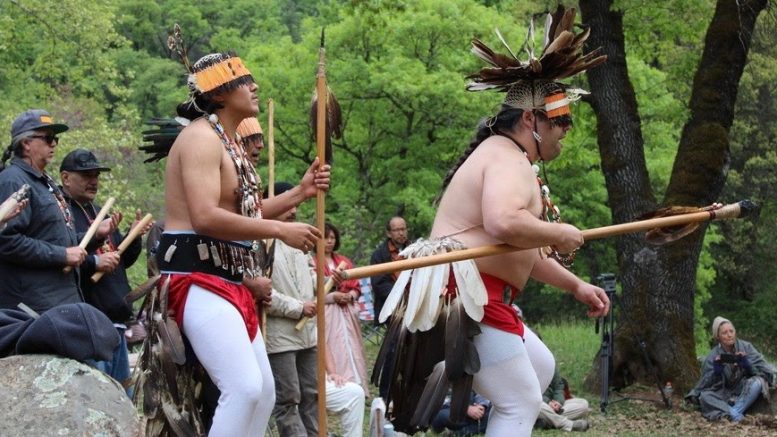By Dan Bacher
As the Delta Smelt has become virtually extinct in the wild – and as spring-run, winter-run and fall-run Chinook salmon populations on the Sacramento River have collapsed – the Delta Tribal Environmental Coalition is taking more urgent legal action, filing an administrative comment with the California State Water Resources Control Board in mid-January.
The coalition, or DTEC, includes the Buena Vista Rancheria of Me-Wuk Indians, the Shingle Springs Band of Miwok Indians, the Winnemem Wintu Tribe, Little Manila Rising, and Restore the Delta. It filed its comment in response to the Water Board’s draft staff report for the Phase II Update of the Bay-Delta Water Quality Control Plan. The coalition is represented by the Stanford Environmental Law Clinic.
“The coalition urges the State Water Board to expeditiously update water quality standards sufficient to protect Delta tribes and communities,” the group said in a statement. “The longer the Board delays, the more Bay-Delta tribes, communities and ecosystems suffer. DTEC will continue to press the Board to fulfill its obligations to protect the Bay-Delta and its residents.”
Bay-Delta Plan Update lacks a sense of urgency during ecological crisis
“For more than a decade, the State Water Board has recognized that the Delta is in a state of ecological crisis and has promised to update outdated 1995 water quality standards to ensure healthy and thriving Delta waterways,” the coalition observed. “Although [the tribal group] applauds the Board for finally taking steps toward an update, the current draft staff report neither proposes meaningful water quality protections nor meaningfully advances efforts toward updating the Bay-Delta Plan with the urgency that the ecological crisis in the Delta demands.”
Among the many concerns with the draft staff report, DTEC’s comments point out that its environmental analysis “does not comply with the California Environmental Quality Act in multiple respects.”
“The staff report, for instance, fails to clearly identify the Board’s proposal for updating the water quality standards, making it challenging for the public to understand and comment on the project,” the coalition contented. “In addition, the Board continues to equivocate on designating tribal beneficial uses despite ample documentation that California Native American Tribes, including members of DTEC, have depended on Delta waterways for sustenance, ceremony, culture, and a broad range of essential uses since time immemorial.”
Through its comments, the tribal collation asks the Water Board to “recirculate the staff report’s environmental analysis and, in doing so, engage in CEQA-mandated consultation with California Native American tribes, create a legally required public trust analysis, adopt tribal beneficial uses on a watershed-wide basis, meaningfully incorporate traditional ecological knowledge into water governance, and adopt a water quality and flow objective to manage the proliferation of harmful algal blooms impacting Delta tribes and communities.”
Gary Mulcahy, Government Liaison for the Winnemem Wintu Tribe, described the Bay-Delta Plan update draft as “basically a farce” that needs to be redressed.
“There are a lot of words but no real substance,” Mulcahy explained. “Almost 600 pages and not one paragraph about how this plan would be implemented. It is like doing a stand-up comedy act with no punchlines. It does include a lot of exclusionary verbiage and insinuation. We may consider this, or this might be something to consider but no concrete answers. Go back to the drawing board.”
Malissa Tayaba, Vice-Chair of the Shingle Springs Band of Miwok Indians, is also highly critical.
“Our existence is tied to healthy rivers, and for far too long the rivers have been diseased by lack of flow from excessive diversions,” Tayaba said. “The Bay-Delta Plan is an opportunity to value our existence through restoration of the plants and animals that depend on healthy rivers. We need a plan that places tribal water needs on equal footing with other water uses. The State Water Board should not squander the opportunity to begin making amends for centuries of violence and discrimination against California’s native peoples.”
Ivan Senock, Tribal Historic Preservation Officer for the Buena Vista Rancheria of Me-Wuk Indians, wants more transparency.
“Without fully planning for, protecting and enhancing the Delta through achievable water quality, equitable management and tribal beneficial uses of Delta watershed rivers and the estuary, the Bay-Delta Plan staff report is woefully incomplete — which is particularly troubling after years of delays due to the closed-door voluntary agreement process which left out Buena Vista Rancheria and the other Delta watershed tribes,” Senock noted. “Water flows are tied to the health of Tribes, Delta communities, fisheries, wildlife, and plant life — all parts of the environment that are tied to indigenous cultural practices and the overall health of Tribal people.”
Barbara Barrigan-Parrilla, Executive Director, Restore the Delta, contends that Big Money continues to carry far more sway with the elected officials and the Newsom Administration than environmental groups and even the land’s most indigenous people.
“It is so unjust that Delta communities and tribes, who have spent years requesting with urgency a Bay-Delta Plan to restore rivers and the estuary, have had to expend incredible energy, time and resources to respond to this completely inadequate document,” Barrigan-Parrilla stressed. “Politics in California water planning protect powerful interests, and senior-level leaders continue to ignore science and protection for all communities and tribes by restoring flows for the estuary.”


Be the first to comment on "Regional Tribal Environmental Coalition challenges State Water Board on Bay-Delta Plan"